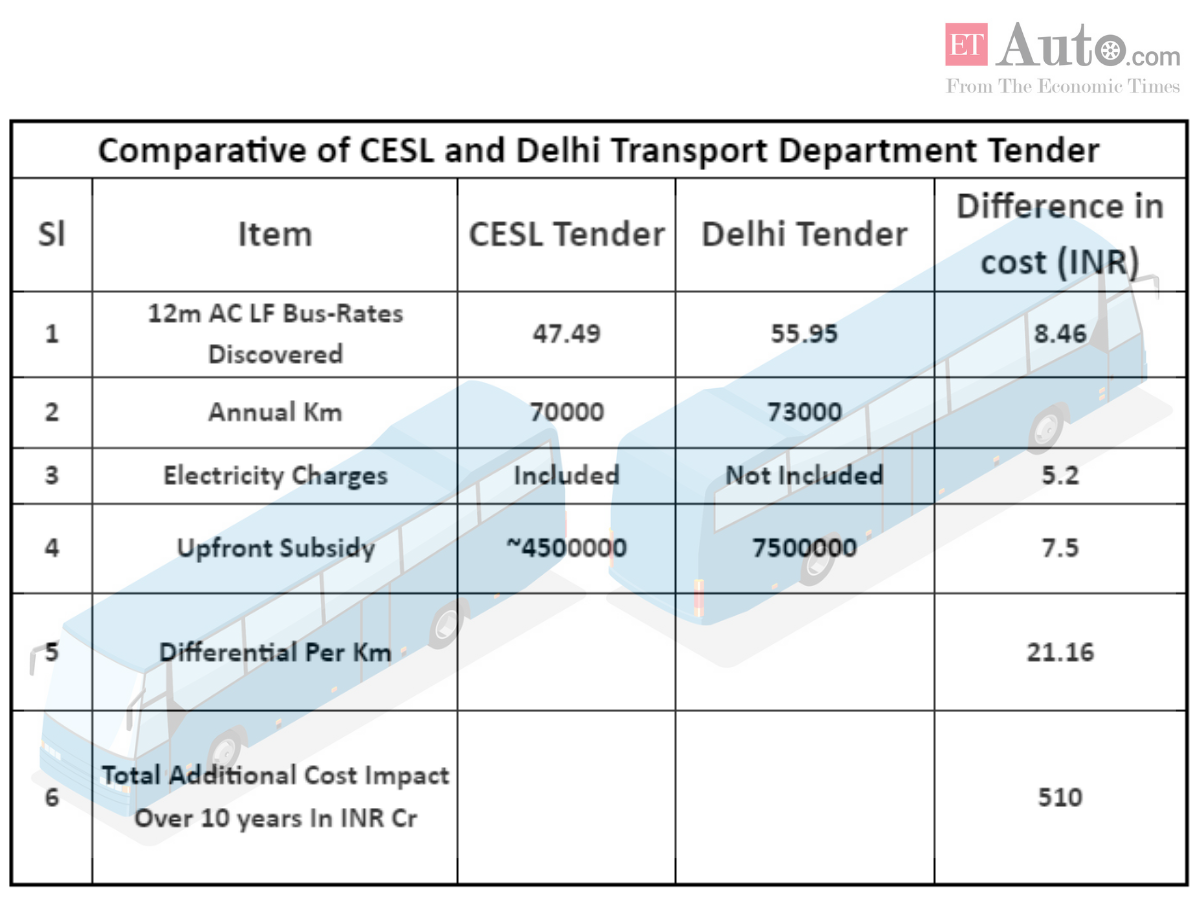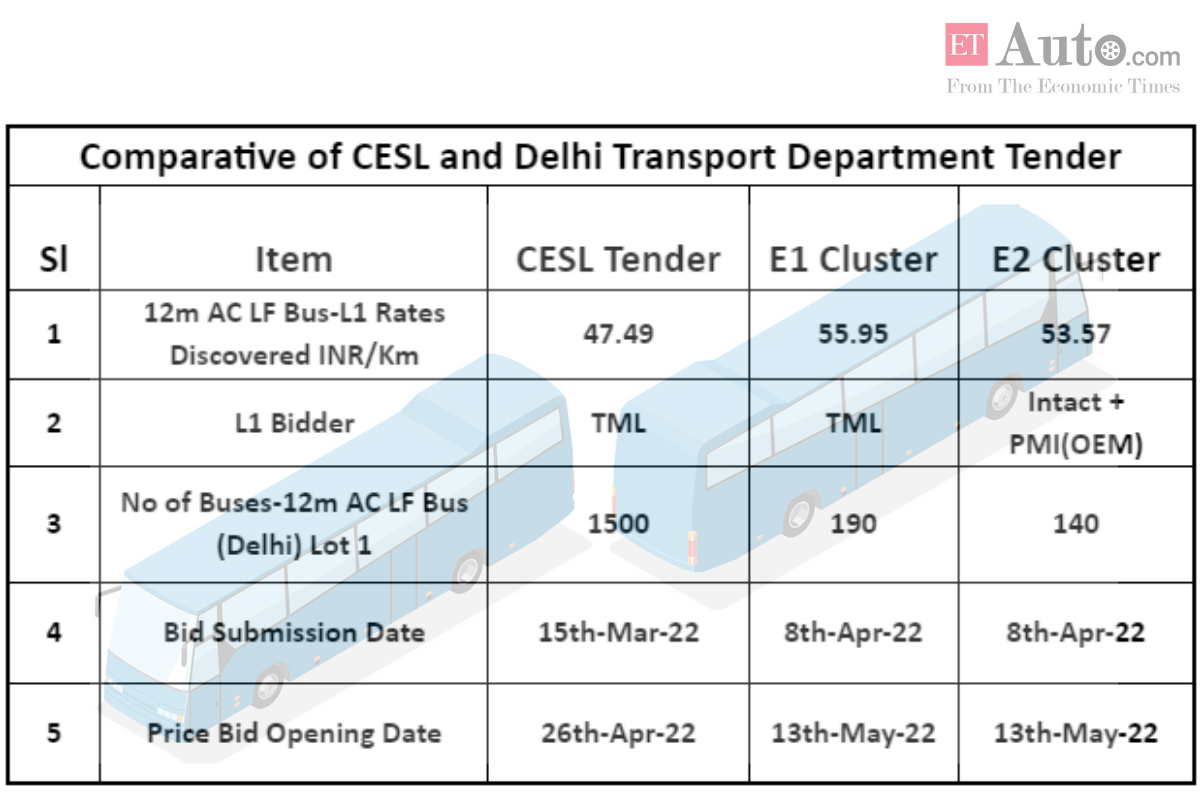New Delhi: Delhi’s transport department is procuring electric buses at a price much higher than that discovered in a tender by Convergence Energy Services Ltd (CESL), the company that handles the acquisition of electric vehicles under central schemes, a person in the know said.
The Delhi government will be paying almost INR 61.15 a km for 330 buses against the lowest quote of INR 47.49 a km in a CESL tender floated in January this year for 5,450 buses, both including electricity charges. Accounting for a higher subsidy for the buses, the rate under the Delhi tender increases to almost INR 68 per km.
Also Read: Delhi’s e-auto scheme in limbo
At this rate, the cost of operating these buses over a 10-year period would be INR 500 crore higher compared with the price discovered in the CESL tender, the person said.
…such a price difference was because of the order size, with CESL’s order being several times larger than that of the Delhi Transport CorporationKailash Gahlot, Delhi transport minister
Delhi transport minister Kailash Gahlot said such a price difference was because of the order size, with CESL’s order being several times larger than that of the Delhi Transport Corporation.
In fact, last week, the Delhi cabinet approved the procurement of 1,500 electric AC buses at a rate of 47.49 per km under the central scheme, Faster Adoption and Manufacturing of Hybrid & Electric Vehicles (FAME). These buses, from the larger tender floated by CESL, are of the same size as those in the 330-bus order, which is under a Delhi government scheme.
The procurements involve a subsidy payment for the companies that supply and maintain the buses. The Delhi government will be paying INR 75 lakh per bus under the 330-bus order. The subsidy under the CESL tender is INR 45 lakh each, which is what Delhi will pay for the 1,500-bus order as well. The impact of the higher subsidy will be about INR 7.50 a km, based on CESL’s formula of INR 0.25 per km for every INR 1 lakh of extra subsidy.
If the Delhi government awards the order at these higher prices, it could result in a huge dent to the exchequer. Over a 10-year period, this is expected to cost the government INR 500 crore extra, the person said.
The first tender was floated by the Delhi transport department after a cabinet approval in October last year. This was for 12-meter electric low-floor buses, to be deployed under the cluster scheme. The lowest bid was INR 55.95/km excluding electricity charge, and about INR 68 including that. The CESL tender was for buses of different configurations, to be deployed in Delhi, Kolkata, Hyderabad, Bengaluru and Surat.
“The CESL tender is for 5,450 buses, which is a huge number,” Delhi transport minister Gahlot said, responding to ET’s questions. “Consider a wholesale rate for 5,450 buses and a smaller-bunch rate for 330 vehicles. With close to 20 times the volume, you would expect a bigger difference in rates.”
He said the Delhi government was able to get nearly similar rates with a small volume as well too. “The bidders are enthusiastic in plying their buses in a city like Delhi where the government has already worked on providing them the required charging infrastructure at all of their bus depots,” he said, adding that the planning had already begun one year back and “we are seeing results”.
The bidders are enthusiastic in plying their buses in a city like Delhi where the government has already worked on providing them the required charging infrastructure at all of their bus depotsKailash Gahlot, Delhi transport minister
Under the CESL tender too, Delhi is the only state that has its depots ready for accommodating 1,500 electric buses, Gahlot said.
Out of the 5,450-electric-bus tender by CESL, 1,750 are for 12-metre low-floor AC electric buses. The remaining buses include 1,800 non-AC 12-metre buses, 475 of 12-metre standard floor non-AC buses, 725 of 9-metre standard floor AC buses and 700 of 9-metre standard floor non-AC buses.
According to the person ET spoke to, the difference of more than INR 20 per km for 12-meter AC low-floor buses under the two tenders was huge, even if the higher volume was factored in.
Currently, cities like Mumbai, Bengaluru, Ahmedabad, Delhi, Lucknow, Indore, Jammu, Shimla, Chandigarh, Hyderabad and Panaji have already deployed electric buses under the FAME scheme.
As per estimates, more than 3,000 electric buses are already on Indian roads. Prices discovered in the CESL tender have set a benchmark for public transportation in India.
Recently, the Bombay High Court directed the Brihanmumbai Electric Supply and Transport to re-issue the tender for electric buses, terming an earlier process “incorrect” where Hyderabad-based Evey Trans had won the bid.
Also Read:


















